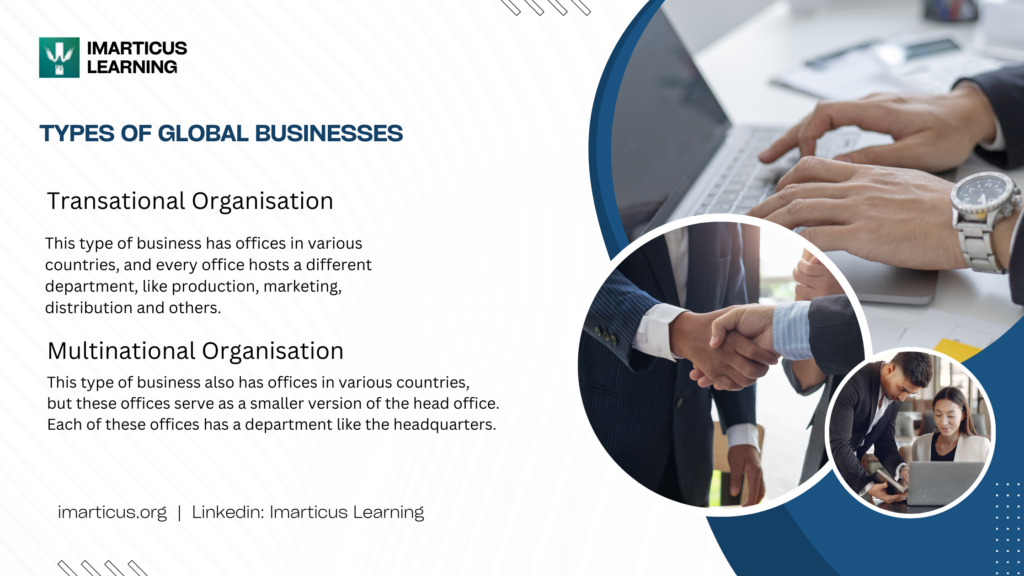Recent times have witnessed enormous business growth, with startups trying to get a foothold in the industry. Investors are looking for ventures to invest in. More established businesses are looking to expand their territory in new countries. Business globalisation is in full swing.
A Chief Financial Officer manages all the financial operations of an organisation, including its global financial operations. Achieving a CFO certification gives you an edge as it is one of the most in-demand career options.
Let's discuss various aspects of the globalisation of the business environment.
What is Globalisation in Business?
Globalisation in business refers to the increase in the steady flow of goods, products, services, personnel, capital and ideas across international boundaries. You can think of globalisation as a process of shifting or expanding some of its facilities to a different country.
Sometimes, to reach a target consumer base in a country, you may be required to have a strong presence. It includes having production facilities, warehouses and distribution centres. Also, in some cases, you can have a separate, self-efficient office in various countries.
History of Globalisation in Business
It is natural for you to think of globalisation in business as a newer concept. Business organisations like Amazon and Google are making large amounts of profits by going global. But the facts say it was here even in ancient times. Here are a few examples:
- Luxury goods such as silk were imported from China to Rome from the 1st century BC to the 14th century AD. Many other countries along the route were also involved in these tradings.
- Countries like Arabia, India, Indonesia, Spain and other areas of Europe were part of the spice route.
- Around the middle of the last millennia, European countries like the United Kingdom, France, Spain, the Netherlands, Portugal and others started venturing into new countries to find potential markets.
- During the Industrial Revolution, the globalisation of business achieved a new height. The United Kingdom, fueled by technological advancement, was manufacturing and exporting goods like textile products and iron to the whole world.

What are the Benefits of Globalisation?
Having a global presence in your business gives you certain advantages. Here is a brief overview of the most significant benefits that globalisation offers:
- Market: The globalisation of business ensures that your products or services reach a more diverse consumer base.
- Lower Prices: Every country has different laws and economic policies. With proper research, you can find out the country with lower production costs.
- Increase in standard of living: Often, we see that a business from a developed country establishes itself in a developing country. It boosts the economy by manifold, thus improving the standard of living in the country.
- Flow of technology: When there is a constant connection between two countries, there is a steady flow of technology and knowledge. It ensures further development of the countries associated with the business.
- New cultures: With the globalisation of business, you can access different foreign cultures like music, art, food and others.
What are the Disadvantages of Globalisation?
We know that the globalisation of business has brought the world a lot closer. At the same time, the globalisation of business offers a few disadvantages. Here is a brief overview of the most crucial challenges it presents:
- Adhering to compliance: Before setting up an office or a factory in a foreign country, a business requires adhering to several employment and labour policies. In addition, the global payroll system also comes into action.
- Recruitment: Recruiting an international workforce is a challenge in itself. A business requires knowledge of salaries and benefits in the country before expanding.
- Workforce exploitation: Often, businesses look for a country where the labour regulations are loose. It enables them to exploit the workforce with cheaper salaries.
- Changes in Immigration Laws: Recently, many countries have strengthened their immigration laws. It threatens a foreign individual aiming to work in a country.
- Loss of cultural identity: Cultures from different countries are finding their way to new countries through globalisation. Sometimes, people belonging to one country lose their own culture in trying to adopt these foreign cultures.
Types of Global Businesses
There are two principal types of global businesses. Here is a brief overview of them:
- Transnational Organisation
This type of business has offices in various countries, and every office hosts a different department, like production, marketing, distribution and others.
- Multinational Organisation
This type of business also has offices in various countries, but these offices serve as a smaller version of the head office. Each of these offices has a department like the headquarters.

Factors to Consider Before Going Global with Your Business
After having a look at different aspects of globalisation, you may well be tempted to have a global presence in your business. But before you jump into it, we need to consider a few key factors in expanding businesses globally and interacting with different business environments.
Laws and Policies
Every country has their rules and regulations to ensure labour safety and compliance. Before starting operations in a foreign country, you must consider these laws. Labour laws, policies regarding benefits and compensation, payroll policies, and others are crucial in forming the structure of businesses in the country.
Environment Factor
Many countries have their own set of environmental policies in place. Businesses should consider these policies before venturing into new countries. Adhering to these policies is something that businesses must achieve to expand globally.
Differences in Culture
Considering the differences in culture is another principle factor. The country you are venturing into may have a different cultural background from yours. Respecting these cultures can make it a lot easier for you to win the hearts of the people of that country. Also, you can choose a workforce that is fluent in local language.
Economic Factor
Before venturing into expanding your business in a country, you must research the country's economic trends. The economic factors to consider are
- Gross Domestic Product or GDP of the country
- Inflation rate
- Rate of currency exchange
- Unemployment rate
- Degree of income inequality
You also require market research for the products or services you aim to offer in the country.
Conclusion
After having this discussion, we can conclude that a business can reach a new customer base and increase its profits by venturing into a relatively new market. These businesses require a specialised workforce. CFO or Chief Financial Officer is one the most in-demand job profiles among these.
If you desire to become a CFO, you should look for CFO training courses. The Postgraduate Certificate Programme for Emerging CFOs by Imarticus offers knowledge on the principle areas required.







